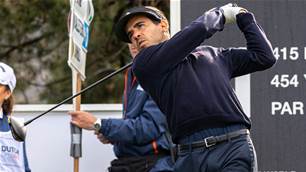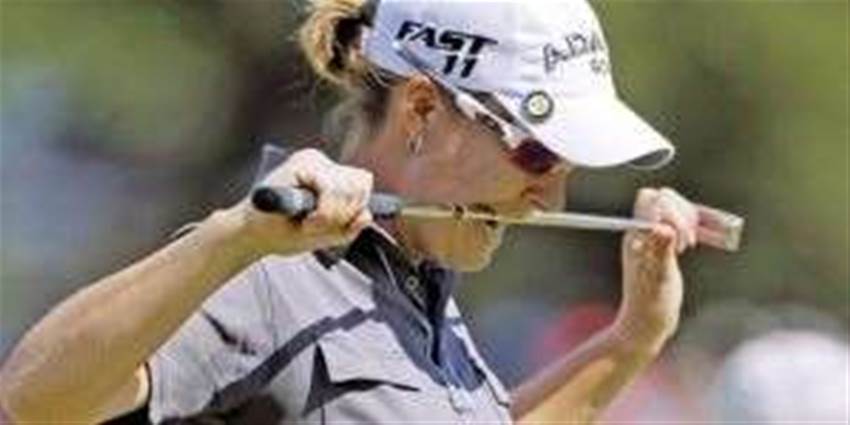Lindsey Wright's win in the Women's New Zealand Open recently was described as a "Victory out of the wilderness".
Looking back now, Wright recognises the longer she went without having her depression diagnosed the greater the toll it was taking on her health, her family and her career.
“One of the hardest things to deal with when you’re dealing with depression is you don’t have a routine,” she says. “And because you’re a golfer, your career, making money is all based on your self-discipline … your motivation. “When you suffer from depression you lose every ounce of any form of motivation you might have once had.
“One day when I was home I went out to the course with my Dad and I hit two balls and said, ‘I’m done, I’m over it, I don’t want to do it.’ I just couldn’t, even physically, swing the club anymore. I just snapped at him and I felt sorry for him. It was difficult for my family because they’re left asking, ‘Where did my child, my shining light, go?’ My parents were extremely worried and kept saying, ‘We don’t know what to do.’
“I just thought that was the end of my career. We were heading into the start of the 2011 ALPG season and I didn’t want to go, didn’t want to play in anything. I was exhausted, mentally exhausted all the time. I was grappling with my career and lost motivation for everything. And then there was that fear of what am I going to do if I don’t play golf?”
Adding to her frustration and angst was not knowing why she felt so bad and how every day was getting harder and harder to deal with.
 “You might go and see a doctor with something like a broken arm and at that time I wish I had a broken arm because it would have been dealt with and I would have known how long it would go for,” Wright says. “But with depression, it just kept going and going … it was awful. The negativity you have, it’s like you’re walking around with somebody on your back dragging you down.
“You might go and see a doctor with something like a broken arm and at that time I wish I had a broken arm because it would have been dealt with and I would have known how long it would go for,” Wright says. “But with depression, it just kept going and going … it was awful. The negativity you have, it’s like you’re walking around with somebody on your back dragging you down.
“I now know that I had probably been battling depression since about 2003. In a career like golf, where you’re uprooted all the time and with my personality, I’m a bit of a home-body, it just snowballed over time. Being in the US too, the people are not as embracing as they are here and they leave you to your own devices, which I find isolating. But it also meant no one recognised the signs I had a problem … With depression, people think you’re just in a bad mood and when you’re on Tour most people only see you for a week and then you’re gone, off to the next event.”
The turning point for the 32-year-old came early last year when a close friend convinced her to seek medical help. She saw her GP in Sydney who “put me on to the right people”.
“I went to a psychiatrist and missed a few tournaments before I started on some medication to help me. But just to get a diagnosis was huge,” she says with a smile.
“I was prescribed some mediation and the doctor said it would take effect within six weeks. But with me it took a day … I instantly felt better.
I wasn’t anxious and my brain stopped going at a million miles a minute.
“It’s the best I have felt since about 2003 … as far as my own personal happiness, being more consistent with my personality. I always thought I was just quick-tempered but I would just snap, and it’s not nice to be around someone who is like that.
“I l ook back now and think, “Bloody hell, how did I live with it for so many years?’”
ook back now and think, “Bloody hell, how did I live with it for so many years?’”
Wright’s battle with the ‘black dog’, her diagnosis and recovery has helped change her life perspective on and off the course. There is a sense as she talks how a huge weight has been lifted off her shoulders and with that she’s itching to start living life to the full.
“I’ve always felt I had a pretty good perspective with things in life but my perspective on my life and where it’s going and what I want out of life has changed,” she says.
“I used to put so much pressure on myself to perform well and being a woman it is harder because the clock is ticking all the time. I’m 32 and I really would like to settle down and have a family and I think that played on my mind too, where I was thinking, ‘I’m stuck on this Tour, I’d go home, see my friends and they’re happy with kids and I’m out here miserable.’
“The way I look at it now and the way I want to lead my life is more for me. I’ve earned the right to really enjoy my life and I’ve made enough money to enjoy it, instead of putting so much bloody pressure on myself to win. That is something that has really changed a lot. I’m a lot more comfortable in my own skin than I was two years ago.
“A lot of people have asked me, ‘What have you been doing, where have you been?’ and I kind of danced around it because I don’t really want to say ‘woe is me’. I didn’t want to make a big deal out of it but I think it’s important to be honest.”
With the pressure valve off, Wright returned to tournaments in January this year after a four-month lay-off and immediately impressed with top-ten finishes in the Canberra Classic, NSW Open and Australian Ladies Masters.Then, in February, she teed up in the final ALPG event of the 2011-2012 season – the ISPS Handa New Zealand Open, which was co-sanctioned with the Ladies European Tour.
After rounds of 70 and 68, Wright shared the lead heading into the final round and, despite a double bogey scare with five holes to play, she nailed a 15-footer at the last hole to claim the title by one shot.
“It was awesome to get my hands on the trophy. It had been eight years since I last won … even weeks after it didn’t seem to have sunk in that I had won,” she laughs.
Related Articles

February 2025 Issue of Golf Australia magazine

Inside Golf Australia: December 2024













